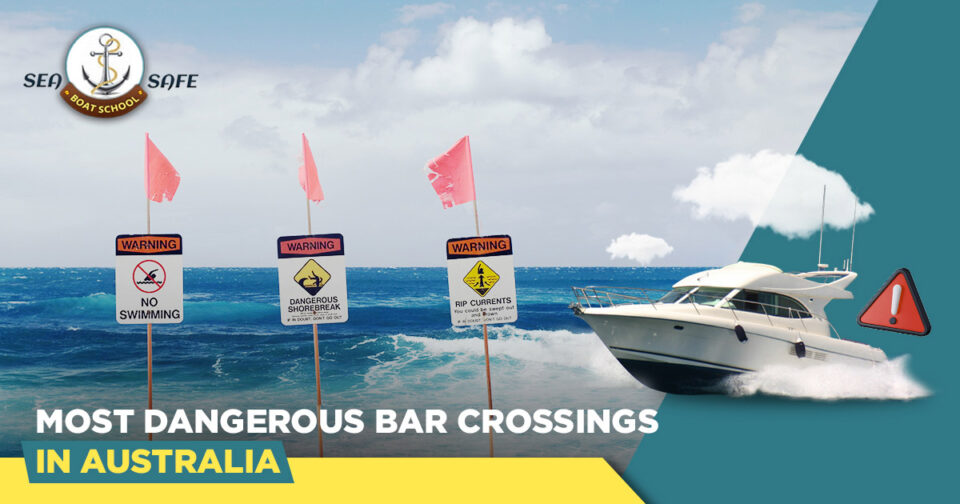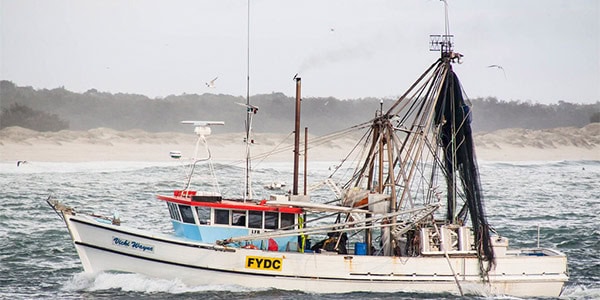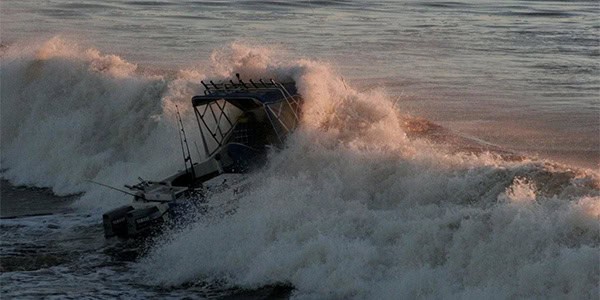Like Our Page :
Sea Safe Boat School
Tony or Arran
0429 146 201
Like Our Page :
Sea Safe Boat School
Tony or Arran
0429 146 201

Australia’s coastal bars are well-known for their dangerous conditions, often causing accidents and fatalities. The treacherous nature of these bars can be attributed to shifting sands, unpredictable currents, and the ever-changing weather.
Whether you’re a seasoned fisherman or just an occasional boater, it’s essential to understand the risks involved in crossing these bars. Here’s a look at some of the most dangerous bar crossings in Australia, along with expert advice on how to cross a bar safely.
Narooma Bar is considered the deadliest tidal crossing on the east coast of Australia. Its narrow and shallow channel has been the site of multiple accidents, with sudden waves often catching even experienced fishers off guard.
In recent years, changes in sea conditions have made it even more hazardous. When crossing Narooma Bar, it’s crucial to always check the weather and sea conditions before heading out.
Located on Queensland’s east coast, Wide Bay Bar is notorious for its shifting sands and exposure to strong ocean swells. The crossing can take up to 30 minutes, and a particularly dangerous section called “The Mad Mile” is known for sudden changes in conditions.
Waves and currents can quickly turn dangerous, so it’s important to time your crossing perfectly. Many boaters recommend crossing at high tide to avoid the worst conditions.
Mooloolaba Bar, in Queensland, is infamous for its unpredictable currents and wave patterns. Navigating this bar requires great experience, as conditions can change rapidly depending on the tide and weather.
It’s often considered most dangerous during the outgoing tide when conditions can quickly deteriorate. Make sure to assess the conditions thoroughly before attempting this crossing.
Situated between North Stradbroke Island and the mainland, Jumpinpin Bar is notorious for its shifting sandbanks and strong currents. Getting the timing right is crucial, as poor timing can expose boaters to large and dangerous waves.
Many boaters report that crossing Jumpinpin requires perfect conditions, and it’s often safer to go with an experienced local to help guide you through.
Barwon Heads Bar in Victoria is known for its tough conditions, especially during rough weather. The entrance to the bar can often be blocked by shifting sand, making it tricky to navigate safely.
During storms or rough conditions, the waters here can become particularly dangerous. Always keep an eye on the weather forecast and only attempt a crossing when conditions are suitable.

Crossing a bar requires careful planning and respect for the conditions. Below are some expert tips to ensure you navigate safely across these dangerous areas:
Before heading out, always check the weather and tidal conditions. Pay attention to forecasts that might predict high winds or rough seas.
Additionally, make sure your boat is in good condition and that you have all the necessary safety gear, including life jackets for everyone on board.
The best time to cross a bar is during an incoming tide when wave conditions are generally calmer. Avoid attempting a crossing during an outgoing tide, as this can lead to dangerous conditions with strong waves and currents pushing against you.
Always take a moment to stop and assess the conditions before crossing. If you’re unsure about the conditions or if you feel uncomfortable, it’s better to turn back.
Don’t risk your safety by pushing forward when conditions don’t feel right. Consider going out with an experienced local boater who knows the bar and can offer valuable insights into the current conditions.
Once committed to crossing, maintain a steady speed that matches the rhythm of the swell. Sudden changes in speed or direction can cause your vessel to become unstable.
If possible, ride the wave into the bar rather than fighting against it, as this can help you maintain control and avoid capsizing.
If you encounter rough conditions while crossing, the key is to stay calm. Focus on keeping your boat steady and avoid panicking.
If the waves become too dangerous, it’s safer to keep moving forward than to try to turn back.

Australia’s bar crossings are some of the most challenging and dangerous in the world. However, with the right preparation and knowledge, you can safely navigate these tricky waters.
Always plan your crossing carefully, check the conditions, and if in doubt, consult with an experienced boater. Whether you’re crossing the infamous Narooma Bar or the shifting sands of Wide Bay, following these safety tips will help keep you and your vessel safe.
For more safety tips and advice on boating in Western Australia, check out Skippers Ticket Perth. Stay safe out there!
Related Articles:

Mike Watson, chef instructor of Sea Safe Boat School, has over 35 years of sea-going experience. Starting his maritime journey at 15 in Grimsby, England, he's sailed locations like Iceland and Greenland. Certified as a Master-5 Trainer, Mike is now dedicated to offering courses to those pursuing their recreational skippers ticket in Perth.
Authorised Provider

 RTO Code: 91487
RTO Code: 91487
Monday to Sunday
8:00AM – 7:00PM
Copyright all rights reserved © Sea Safe Boat School. Website by Selling Online Made Simple. Sitemap.
